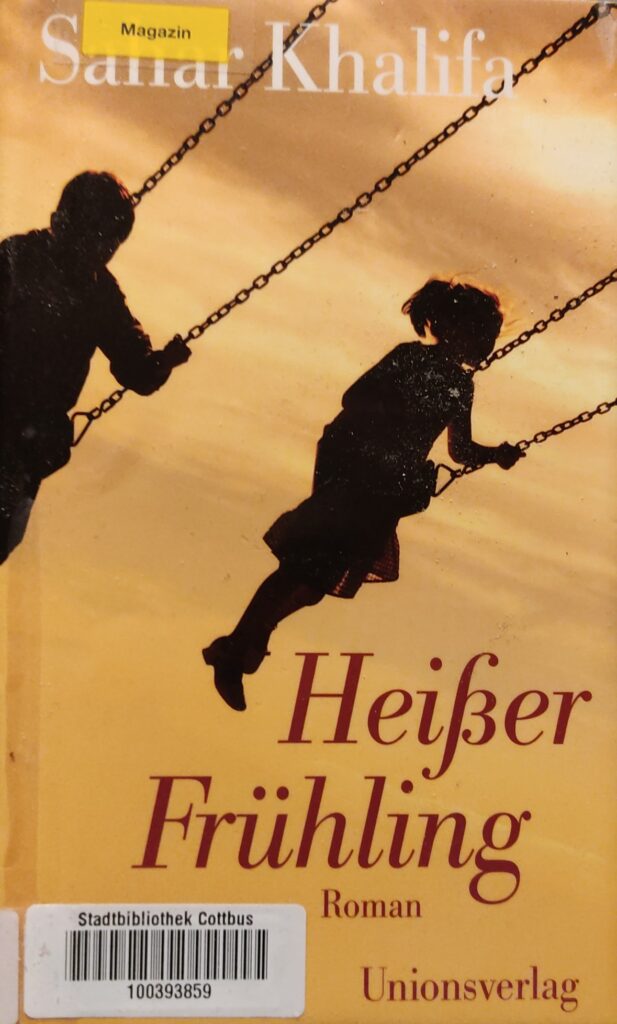Eleven books finished this month, all but two by women/POC (mainly because of my month’s #ReadPalestine topic), just two in German (but I made some progress with WIPs), one Portuguese re-read, and one graphic novel.
- Vatermal — Necati Öziri
- And Still We Write — Publishers for Palestine, tr. various
- Power Born of Dreams — Mohammad Sabaaneh, tr. Dalia and Mouin Rabbani
- Recognising the Stranger — Isabella Hammad
- Empire in Black and Gold — Adrian Tchaikovsky
- Arabilious: Anthology of Arab Futurism — Cristina Jurado and Francesco Verso (ed.)
- Thyme Travellers — Sonia Sulaiman (ed.)
- Forest of Noise — Mosab Abu Toha
- Metal from Heaven — August Clarke
- Heißer Frühling — Sahar Khalifa, tr. Regina Karachouli
- Um Milhão de Finais Felizes — Vitor Martins

Starting with the Palestinian books, And Still We Write was produced in direct response to the ongoing genocide, and consists of a series of poems and other short texts by various authors about the effects of the campaign on Gazans, and on writers in particular. It’s hard to assess this one in artistic rather than political terms, and I doubt that it’s one which I’ll be coming back to, but it’s an undoubtedly powerful experience.
Graphic novel of the month was Power Born of Dreams, and it’s fantastic. Essentially non-fiction, it focuses on the artist imprisoned in an Israeli jail, using his art to tell his own story and those of others, in dialogue with a bird which comes to visit him. The expressionist art style is brilliant, converting the dark subject matter into a thing of beauty.
Recognising the Stranger was something of a relief in that it is not so directly concerned with the politics of the region; Hammad uses the ideas of Edward Said to explore the motif of coming to a realisation in a story, then applies this to people in or observing the apartheid system. Hammad’s lucidity makes her argument all the more convincing.
I read two books of short stories: Arabilious is not specifically Palestinian, though it includes several Palestinian authors. Of these, Farah Kader’s To New Jerusalem stood out, combining standard post-apocalyptic tropes with lightly-worn world-building. Thyme Travellers also has several excellent stories, especially the absurdist Down Under (Jumaana Abdu) and Karl El-Koura’s Cyrano de AI, which has an interesting and moving take on the now ubiquitous idea of AI.
(Honourable mention also for Out of Time, the collected stories of Samira Azzam, which I’m in the process of reading, and very much enjoying. They’re also political, but primarily in the area of women’s rights and family relationships.)
Forest of Noise was the only full volume of poetry I read. It’s outstanding, inevitably addressing the plight of the people in every poem, but with a variety of approaches which avoids the oppressiveness which could so easily build up. Highly recommended.
Lastly, and not so recommended, Heißer Frühling was at least interesting. It shows two brothers being sucked into the conflict, but as it goes on it gives less and less insight into them as people as the journalism and propaganda take over. Credit to the German publisher for bringing it out, at least!
The other German book this month was Vatermal, the story of a Turkish-German family growing up in the absence of the father. The mother is the focus of the novel, and is very well-drawn: the narrator son is fully aware of her faults, but still presents a rounded picture of an impressive character.
(I’ve also been reading Kinder der Befreiung — nearly finished — and have started Monde vor der Landung, both hopefully to be finished next month.)
Um Milhão de Finais Felizes was my re-read: nothing really new to say about it, other than that this time I appreciated more the conversations which take place between the narrator and various friends later on in the book where they show interestingly different responses to his situation.
And lastly two fantasy novels: Empire in Black and Gold is the first in a series of ten (10!) which I don’t think I’m going to complete. Tchaikovsky’s later books are substantially better, and I’d prefer to focus on them, though I did still enjoy this one. The YA elements (peril is very mild) and racial premise are substantial stumbling blocks for me.
Metal from Heaven, on the other hand, is solid gold. It’s rather intimidating at first — the elaborate prose is like an extra character involved in the narrative voice, and takes some getting used to, but once past the first chapter I got into the flow of it. It’s a lesbian socialist bandit revenge fantasy — one of those — set in a world with lots of unexplained details that you just have to go with (like this world). It’s not perfect: the central premise takes some swallowing, the more so as it’s developed towards the end. But it’s beautifully-written, has strong characters, and tells a rip-snorter of a story.
So, on to 2025. In January I’m off to South Asia, while over the course of the year I should complete the group read of Tom Jones, there’s some more Barthes, presumably a new season of Portuguese in Translation book group, and I’ve signed up for the first of a monthly programme of Shakespeare seminars….
